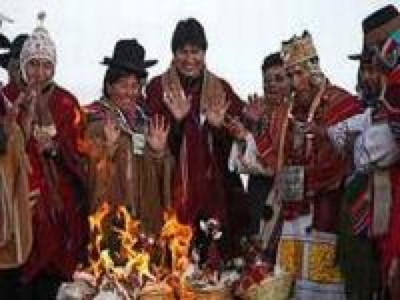
Bolivia: Aphrodisiacs, spells and pleasures of the Andean world
August 8, 2013 - pravda.ru
Broths and roots, powders, essences, ointment, mysterious herbs, mate and syrups are the main ingredients of a kind of Andean tantra, the unique and millenary traditions associated with the practice of tantric sex in Bolivia.
Like all nations with a long history, the indigenous peoples of Bolivia also left us techniques, recipes and spells to try to control and cure the pains and pleasures of human passions, despite having installed in the common sense of society an iron conservative mentality with the arrival of the Spaniards and the Catholic Church, which continues today.
The advice of the Indian Tantra or the Kamasutra itself are well known, but very few know that this side of the world, the Andes, the first people also created their own philosophy of pleasure and experimented with its natural products to make the meeting of bodies is more pleasurable.
Unfortunately, much of this ancient knowledge was lost in the ruins of time and the Conquest, but also in communities originating in Bolivia, and even among the common people, some aphrodisiacs, techniques and philosophies persist in the form of food, drinks, and even rituals.
Among the food, probably the best known is called Caldo de Cardán, a kind of soup whose main ingredient is the reproductive organ of the bull that supposedly guarantees the potency of men, even after a hangover.
A dish of this soup costs around two dollars, and according to Maria Bernal, a 68-year-old lady who prepares it at a popular restaurant near the Plaza San Francisco in La Paz, is consumed by all kinds of people, especially on weekends. But she explains it is not just for virility: it is also used to cure anemia, muscle pain and body weakness.
They say that the secret is in the preparation, it takes almost 10 hours. The night before it begins to be cooked over a slow fire, so it is very concentrated on the following day.
The broth can include or not, as another of its ingredients, the millennial 'papalisa', a sort of tuber used by the Incas and that, according to common tradition, is a healthy substitute for viagra.
It is so well known here that even the Bolivian Foreign Minister David Choquehanca spoke about it at a meeting of the Organization of American States.
"We have in Aimara the 'ullucu', which is known as 'papalisa', which probably is not eaten here in the United States, ... but when you eat 'papalisa' you do not need viagra ", he said.
Another tuber with aphrodisiac properties for Bolivians is the 'maca', like the carrot, whose products are sold in pharmacies for natural products.
Patricia Aguilar owns one of these pharmacies, near the church of Gracia, and she informs us that the root is dried, milled and the powder prepared in the form of mate, is used to stimulate the male sexual organ.
But if the natural pharmacies offer some options, the apotheosis of these products is unique in the Witches Market, in the city center, where a group of Aymara women preserve ancestral knowledge and products of native peoples.
They themselves produce scents to find a partner or seduce lovers, with suggestive names such as 'Come to me'; 'Follow me, follow me'; 'Seven males'. Trademark (sic), 'Pusanga: Love, sex, pleasure'; whose packaging bears the legend: 'The unique and authentic perfume that binds and attracts the beloved'.
They also sell different powders to attract looks, and syrups and anointed with trade names: Erectol and Sexovit and "invigorating instantly" called Vita Man, Great Vigor, Break the Mattress, among others.
Juanita Quispe one of the chifleras or witches, says these products should be taken three times a day for best results, dissolved in water, or neat with the dosage on their own packaging.
She warns that one should not pass such a measure, because then she would not be responsible for the results. Then she asks if I will buy something eventually because otherwise she does not understand why I ask so many questions.
Source: La Paz, (Prensa Latina)
In Patria Latina
http://www.patrialatina.com.br/editorias.php?idprog=fa6f278a192469e3da1a8d72f1e5af23&cod=12180
Translated from the Portuguese version of Pravda.Ru
Olga SANTOS